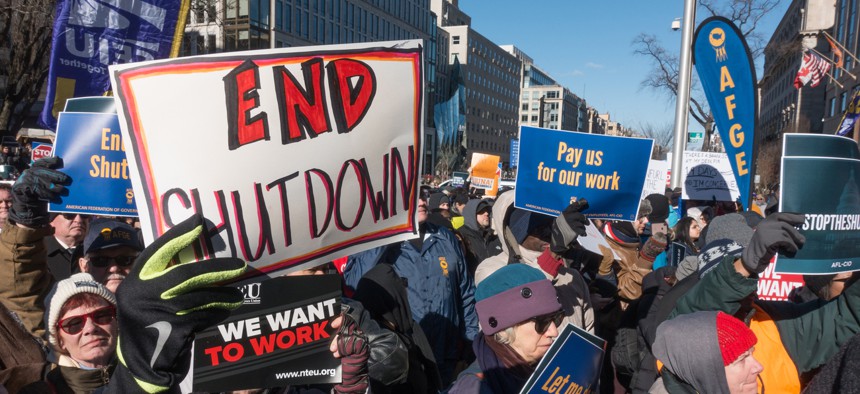
Furloughed as well as unpaid working federal employees, union members, contractors and supporters protest the government shutdown at an AFL-CIO rally Jan. 10, 2019. Shutterstock.com
A Guide to Pay and Benefits During a Shutdown
Although lawmakers ultimately expect to reach a deal on federal appropriations, failure to pass a bill before Friday’s deadline could lead to a short lapse in funding. Here's what feds need to know.
As of Wednesday, lawmakers and the White House had just two days to complete negotiations and pass an omnibus spending package to avert a government shutdown beginning Friday night.
If President Trump does not sign appropriations legislation or a continuing resolution, federal agencies would be forced to limit their activities or shut down entirely beginning Dec. 19. Although congressional leaders in both parties are confident they will reach a deal on agency funding and coronavirus relief, the longer negotiations persist, the more likely it will be that a short-term continuing resolution will be needed to avoid a lapse in appropriations.
Here is what federal workers can expect in terms of pay and benefits if the government closes, based on guidance from the Office of Personnel Management in 2015, as well as a number of updates signed into law following the 35-day partial shutdown that began at the end of 2018.
Salaries: Furloughed federal employees and workers who are deemed essential and forced to work during an appropriations lapse will not be paid for the duration of the shutdown, although all federal workers will be granted back pay once funding is restored. The back pay is guaranteed by a 2019 law signed by President Trump following the 35-day shutdown that year.
Bonuses: Agencies may award performance bonuses during a shutdown, but they won’t be paid until after agencies reopen.
Unemployment: Federal workers who are furloughed are eligible for unemployment compensation in some states. But in many cases, employees must return the money once they receive back pay.
Health care: Furloughed employees will maintain their coverage under the Federal Employees Health Benefits Program during an appropriations lapse. Premiums accrue over the course of a shutdown, and then are taken out of employees’ first paycheck after the government reopens.
There are a number of recent changes that were enacted following the 2018-2019 shutdown on this topic: Feds no longer need to worry about the status of their vision or dental coverage under the Federal Employees Dental and Vision Insurance Program—carriers are prohibited from allowing those policies to lapse due to nonpayment.
And federal workers now may make changes to their insurance plans due to significant life events during a shutdown, thanks to new regulations from the Office of Personnel Management. During the 35-day partial government shutdown, some employees found they were unable to enroll new dependents in their insurance programs because agency HR employees were furloughed. Now, employees responsible for handling FEHBP enrollments will be deemed “excepted” workers during a lapse in appropriations.
Retirement benefits: Retirees in the Civil Service Retirement System and the Federal Employees Retirement system will still receive their benefits during a shutdown. Employees who are enrolled in the Thrift Savings Plan—and their agencies—will not contribute to their retirement accounts until pay resumes following a lapse in appropriations.
Leave: Employees may not substitute paid leave for unpaid furloughs when the government is closed. If a shutdown commences, an employee’s already scheduled annual or sick leave would be cancelled. And if a federal employee is considered essential by their agency, they must report for duty during a shutdown, regardless of whether they had already scheduled leave, although managers have some flexibility to accommodate the need for “brief or intermittent” time off.







